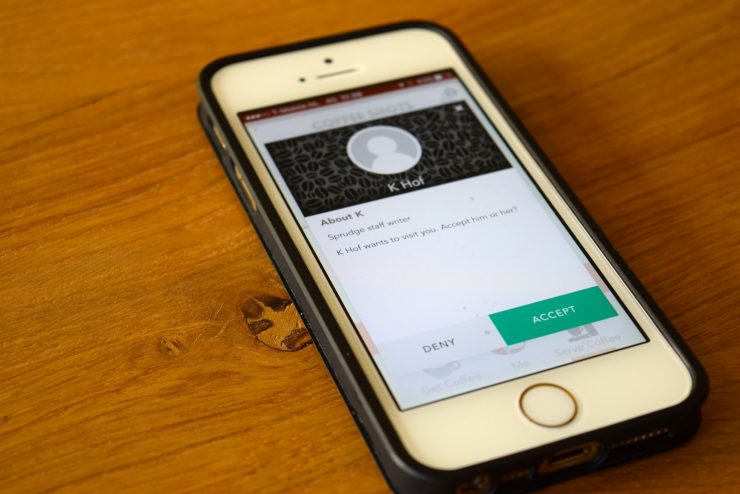
Ever been stuck driving between cities with no coffee options except for gas stations and chains? Do you belong to a social group with regular meet-ups? Do you often find yourself playing the role of host and coffee-klatch coordinator for groups of your friends? Are you a barista who would welcome the chance to practice your bar skills with patrons in a low-stress domestic setting?
If your answer to any of the above is yes, then an app developed by Dutch entrepreneurs may have your name on it. Or rather, you may want to build a name-heralding profile in this new marketplace community. It’s called Coffee Shots, and its aim is to lead discerning coffee drinkers to the homes and personal workspaces of discerning baristas, be they amateur or professional. There they use their preferred ingredients and apparatus to pull, pour, or plunge—and make a little money along the way.
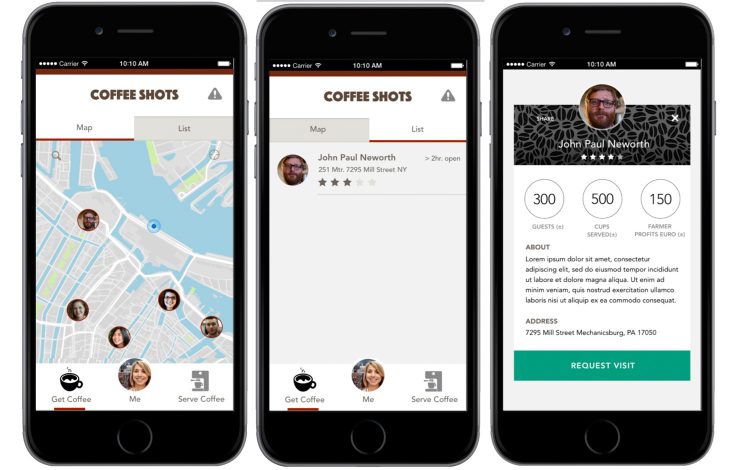
During the Amsterdam Coffee Festival in March, the Coffee Shots stand was getting good attention. The company reported that 150 attendees, from countries as near as France and as far as Canada, volunteered as beta testers for the app, with another 100 signing up online. In May, Coffee Shots went official, the app appearing on both Google Play and in the Apple Store.
So how does it work? A user downloads the free app, available for phones and tablets running iOS and Android, then creates a profile and links it to a credit card or PayPal account. Those who want to serve coffee specify where they are, when they can receive guests, the machinery on hand, and a menu. Users looking to get coffee rely on the app’s geolocator to see whose doors are open at any given time. Once Coffee Shots users settle on an appealing profile and an accessible location, they request a visit and, upon approval, receive address details.
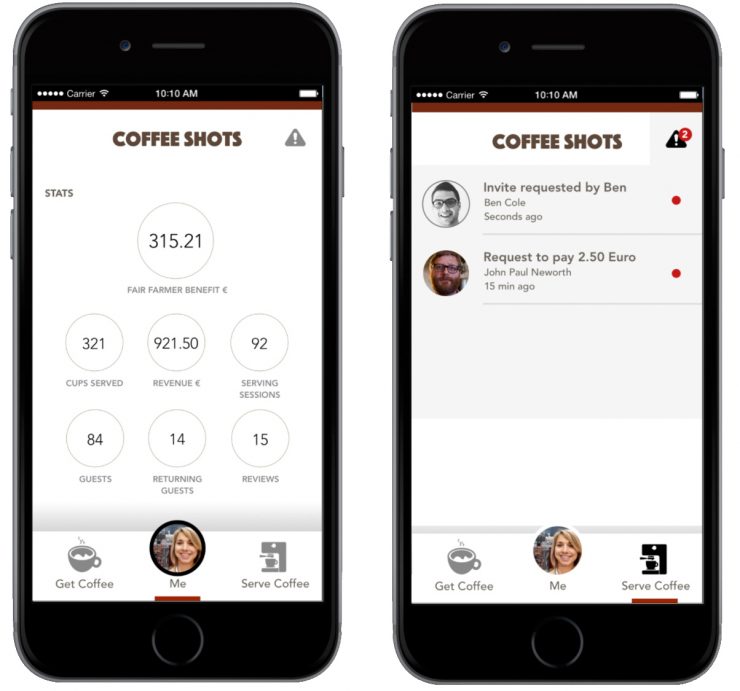
Prices are set by the barista, though Coffee Shots suggests €1.50 for an espresso, €2 for a cappuccino, and 50-cent increments per shot. The company keeps 20 percent of the fee; most is earmarked for further app development, though 10 percent of that commission is for “the farmer”—an origin-country farming project that Coffee Shots selects. Before leaving the barista’s home, the customer pays digitally, via the app, and afterward, a review request is sent.
When not working at perfecting the Uberisation of coffee, Coffee Shots founders Arnoud Aalbersberg and Corine Schmal work at Tropicare, a travel health-care-product company that donates 1 percent of its turnover to support the eradication of malaria. Aalbersberg, who founded Tropicare more than two decades ago and has provided much of Coffee Shots’ startup capital, notes how both engage with regions of the world that suffer from malaria and uneven development.
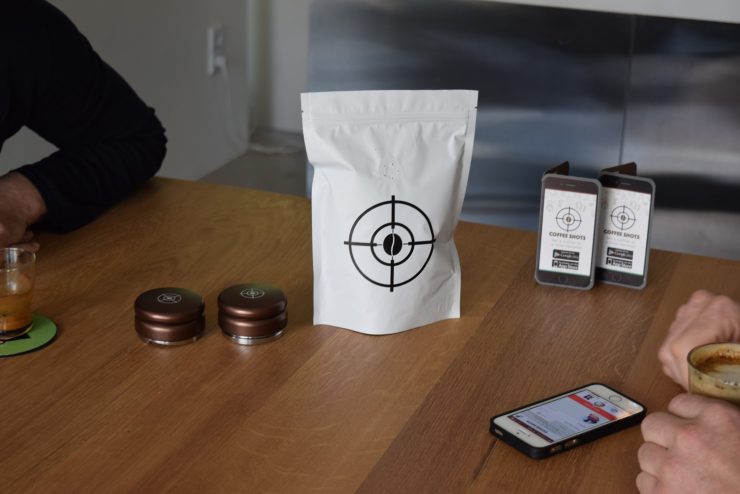
Of the Coffee Shots tagline—“honest coffee for everyone”—Aalbersberg explains: “We think the farmer should work on every part of the value chain and not only get pity money for the green beans. And the other side is that we think if you pay €4 here in Amsterdam for a mediocre coffee, that’s also not very honest.”
The peer-to-peer transaction espoused by Coffee Shots is seen as co-existing with, not replacing, commercial espresso bars.
“Would we ever be a threat to the coffee business? I don’t think we would, but we are very quality-driven, so we might be a threat to poor-quality coffee,” says Arnoud Kruiver, Coffee Shots’ chief roasting officer. He does that job at a small roaster alongside his work at Vintage Espresso Machines, a repair and restoration company located in the nearby suburb of Amstelveen. The company is run by Roland Buurman, who doubles as Coffee Shots’ chief operations officer.
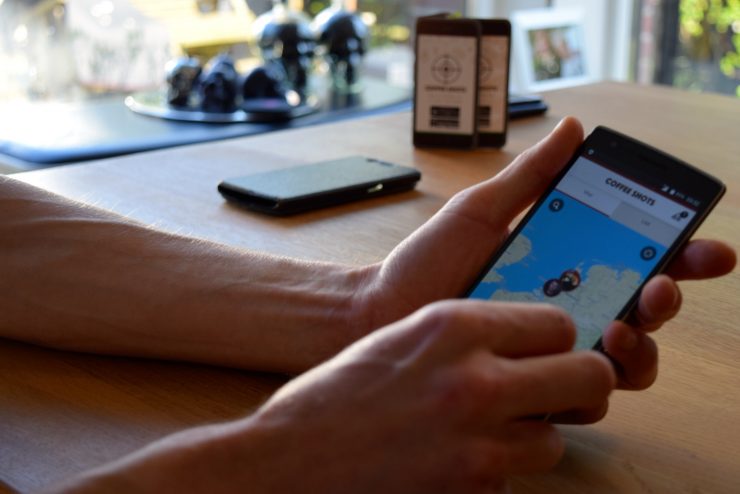
“Where [coffee]’s the core business, we won’t ever be a threat,” Kruiver elaborates. “But there are a lot of businesses in the Netherlands where the coffee is on the side, and there, yeah, I would skip those to go to a home barista any time.”
For would-be home baristas lacking supplies, Coffee Shots sells bags of Kruiver’s roasts and vends or leases Rocket Giotto and Cellini PID espresso machines and Mahlkönig Vario grinders. Those without a suitable space can consider the Coffee Shots kiosk. Established under the auspices of MIK Amsterdam, a project that gives retail space to community-engaging startups, the small venue went operational in mid-June and is accepting baristas’ reservations to, essentially, time-share the bar (to schedule a shift, email info@coffeeshots.nl). Working at the kiosk brings the company’s commission rate up to 50 percent, allaying costs of rent and the in-house provisions.
Coffee Shots’ partners see a potential “to become the largest and most social coffee community”—not just in the Netherlands but globally. As it’s been available for only some weeks, it’s too soon to evaluate. (The company might want to adjust its logo for a US audience, at least; cheeky as its meant to be, crosshairs over a coffee bean won’t resonate the same in the States.)
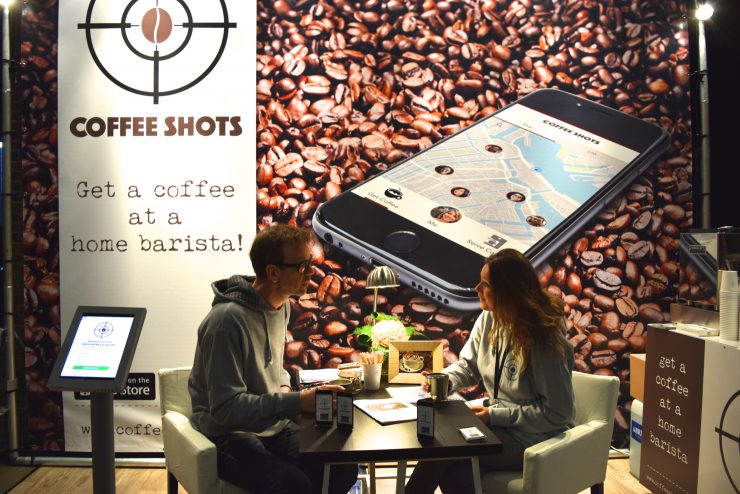
Yet, the app already brings to light some of the specialty scene’s assets—most often highly committed, adventurous, and welcoming types of people—and its potential drawbacks, such as the way quality cafes frequently cluster in more affluent neighborhoods and are sometimes more conducive to interfacing with gear and gadgets than with humans.
That users enlist as home baristas “is a sign of trust and passion,” believes Aalbersberg. “They don’t live from it. They don’t have to make a coffee. They want to make a coffee.”
While the barista-as-bean-whisperer is a 21st-century notion, the app is simultaneously promoting what seems to be a now-retro social ritual.
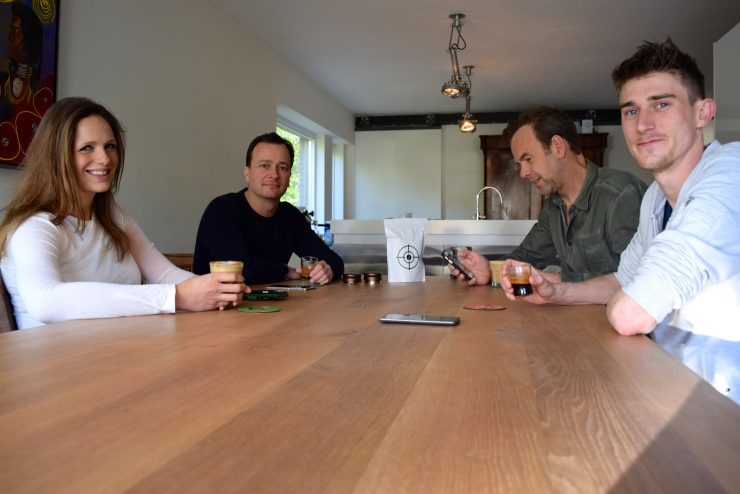
Corine Schmal, Roland Buurman, Arnoud Aalbersberg, Arnoud Kruiver
“In the Netherlands, but also in other countries that I know, 20, 30 years ago it was very normal for your kitchen door to be unlocked, and your neighbor would walk around your house, open the door, say, ‘Hello. Hey, let’s have a coffee,’ ” says Aalbersberg.
“To bring that back by facilitating the [ritual] in a modern way” is how he describes his hope for the app. “So it’s not that the door is unlocked,” he emphasizes. “It is that someone in the street…or maybe a little bit further away can see: ‘Hey, Arnoud is open for a coffee. I feel like a coffee, and I feel like a conversation.’ ”
Karina Hof is a Sprudge staff writer based in Amsterdam. Read more Karina Hof on Sprudge.
The post This New App Is Like Tinder For Coffee appeared first on Sprudge.

